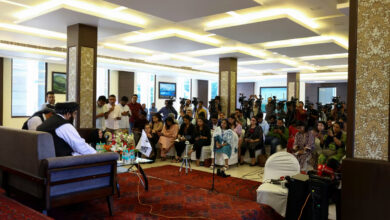The system in place for the upcoming parliamentary elections puts many obstacles before female candidates and may lead to a parliament devoid of women, said Egyptian activist Nehad Aboul Qomsan, head of the Egyptian Center for Women's Rights, on Saturday.
While previously the women's quota meant female candidates won a minimum of 64 parliament seats, as the quota is now canceled, there is no guarantee that women will be represented, Qomsan said.
In 2009, the People's Assembly, the lower house of parliament, passed the law that specified the women's quota. This raised the presence of women in the assembly to more than 12 percent in an expanded parliament of 518 seats as opposed to the previous 454.
On the sidelines of a meeting on women's rights held at the British Council, Qomsan said that the current parliamentary law obligates political parties to nominate only one female candidate on its proportional lists, which include usually 10 candidates. The law did not clarify whether female candidates should be put at the top of lists, Qomsan added.
She said that women occupy, on average, the fifth place on lists, which means that in order for a female candidate to win, her list must win 50 percent of votes, which will be far from reality in the elections.
Women are expected to win between 2 percent and zero percent of the seats, Qomsan said.
Activists called on the military council, which has been running the country since the resignation of former President Hosni Mubarak on 11 February, to allocate women 30 percent of the electoral lists, with a relative distribution on each list.
Qomsan said, "This means that every three names would include a female candidate, which could lead to representation of between 10 percent and 12 percent of women in the next parliament."
The increased geographical area of electoral constituencies requires candidates to increase their campaigning efforts and spend more money, which puts an additional burden on women given the conservative nature of the community, Qomsan said. Furthermore, election campaigns in Egypt are usually centered around cafes, mosques, and other places that are less accessible to women, so they are "sailing against the current."
Around the world 108 countries apply a women's quota in their parliamentary elections, but political forces in Egypt refused to allocate 50 percent of their lists to women candidates as some consider it discrimination against men, said Qomsan.
She also pointed out that political forces said they do not have female candidates that are popular enough to make up 50 percent of their lists.




